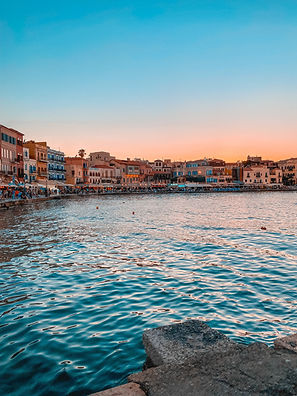
Accessible
CRETE
Crete is a place to admire the remnants of brilliant civilizations, explore glorious beaches, impressive mountain escapes, fertile valleys and steep gorges, and just be part of the island’s rich gastronomic culture.
Crete is the largest island in Greece, and the fifth largest one in the Mediterranean Sea. In Crete you are able to admire the remnants of brilliant civilizations, explore glorious beaches, impressive mountain scapes, fertile valleys and steep gorges, and become part of the island’s rich gastronomic culture. Crete is, after all, a small universe filled with beauties and treasures that you will probably need a lifetime to uncover!
Source: www.visitgreece.gr
Wheelchair Friendly Attractions in Crete

Accessible Agios Nikolaos
It is the capital town of Lassithi where the bottomless salt lake Voulismeni dominates the area. A narrow channel of water connects the lake with the sea, while an imposing backdrop of red rock and trees add to the natural beauty of the scenery. A small pine tree park lies above the lake, and a stone path leads to its southern section to a cute small harbour for fishing boats. The city boasts interesting Archaeological, Folklore, and Natural History museums, Byzantine churches, a well-organised marina, bustling pedestrian streets (ideal for leisurely walks), and traditional squares with buzzing cafés and restaurants.


Accessible Chania
A place where different civilizations have flourished throughout the centuries. Strolling around the Old Town’s maze-like alleys with the beautiful Venetian mansions, the fountains, and the churches will guide you through well-preserved historical monuments. The city of Chania is built on the area of Minoan Kidonia, at the end of the homonym gulf between Akrotiri and Onicha peninsulas. It was the former capital city of Crete (from 1847 until 1972). Nowadays, it is the second-largest city of Crete after Heraklion and capital of the homonym prefecture. We recommend to familiarize yourself with the city of Chania by wandering around in its streets, visiting its museums and admiring the different architectural styles presenting the historical route of the city.
It is the largest city of Crete and one of Greece’s major urban centers. Its development begun in the wake of the 9th century AD (in antiquity, Knossos was the island’s most important centre, followed by Gortyn). In later times, Heraklion came under Arabic, Venetian and Ottoman rule; its conquerors initially gave it the name Khandaq or Handak, which was later changed to Candia. During the 2004 Olympic Games, the city of Heraklion provided one of the venues for the football tournament. Rethymno is located in the north end of the prefecture, built by the sea and is a city with many faces.

Heraklion for wheelchair users

Accessible Rethymno
Or Rithymna as it was once called has been inhabited since the Later Minoan III period. Nowadays, it keeps the elements inherited by its history (from antiquity up to now), preserving at the same time the characteristics of a modern city. You can reach Rethymno by boat from Piraeus or by plane from Athens to Chania and then drive 60 km to Rethymno.



Knossos Palace for the mobility limited
The partially accessible Knossos Palace was the most prominent centre of the Minoan Civilization. It is located just 6 km away from the city of Heraklion and is considered to be one of the largest archaeological sites ever discovered in Crete. According to the old stories,it is here, where the famous King Minoa used to live. It was not just a royal home, but also where the important matters were handled and religious ceremonies performed for the whole area. The place is also linked to exciting myths, such as the one about the Labyrinth with the Minotaur, and the tale of Daedalus and Icarus.
Source of information: https://www.visitgreece.gr/
Services for Wheelchair Users in Crete







